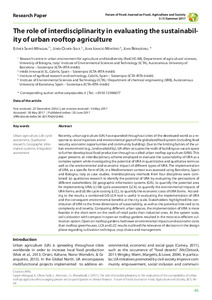Aufsatz

The role of interdisciplinarity in evaluating the sustainability of urban rooftop agriculture
Zusammenfassung
Recently, urban agriculture (UA) has expanded throughout cities of the developed world as a response to social injustices and environmental gaps of the globalized food system (including food security, economic opportunities and community building). Due to the limiting factors of the urban environment (e.g., land availability), UA often occupies the roofs of buildings as vacant space to further develop local food production through so-called urban rooftop agriculture (URA). This paper presents an interdisciplinary scheme employed to evaluate the sustainability of URA as a complex system while investigating the potential of URA in quantitative and qualitative terms as well as the environmental and economic impact of different types of URA. The implementation of URA, as a specific form of UA, in a Mediterranean context was assessed using Barcelona, Spain and Bologna, Italy as case studies. Interdisciplinary methods from four disciplines were combined: (a) qualitative research to identify the potential of URA by evaluating the perceptions of different stakeholders; (b) geographic information systems (GIS), to quantify the potential area for implementing URA; (c) life cycle assessment (LCA), to quantify the environmental impacts of URA forms; and (d) life cycle costing (LCC), to quantify the economic costs of URA forms. According to the results, a combined GIS-LCA tool is useful in evaluating the implementation of URA and the consequent environmental benefits at the city scale. Stakeholders highlighted the contribution of URA to the three dimensions of sustainability, as well as the potential risks tied to its complexity and novelty. Comparing different urban spaces, the implementation of URA is more feasible in the short-term on the roofs of retail parks than industrial ones. At the system scale, soil cultivation with compost in open-air rooftop gardens resulted in the most eco-efficient cultivation option. Open-air rooftop gardens had lower environmental impacts and economic costs than rooftop greenhouses. LCA and LCC results outlined the relevance of decisions in the design phase regarding cultivation technique, crop choice and management.
Zitierform
In: Future of Food: Journal on Food, Agriculture and Society. Witzenhausen : University of Kassel, Department of Organic Food Quality and Food Culture. - Vol. 5, No. 1 (2017), S. 46-58Zitieren
@article{urn:nbn:de:hebis:34-2017042652446,
author={Sanyé-Mengual, Esther and Oliver-Solà, Jordi and Montero, Juan Ignacio and Rieradevall, Joan},
title={The role of interdisciplinarity in evaluating the sustainability of urban rooftop agriculture},
year={2017}
}
0500 Oax 0501 Text $btxt$2rdacontent 0502 Computermedien $bc$2rdacarrier 1100 2017$n2017 1500 1/eng 2050 ##0##urn:nbn:de:hebis:34-2017042652446 3000 Sanyé-Mengual, Esther 3010 Oliver-Solà, Jordi 3010 Montero, Juan Ignacio 3010 Rieradevall, Joan 4000 The role of interdisciplinarity in evaluating the sustainability of urban rooftop agriculture / Sanyé-Mengual, Esther 4030 4060 Online-Ressource 4085 ##0##=u http://nbn-resolving.de/urn:nbn:de:hebis:34-2017042652446=x R 4204 \$dAufsatz 4170 7136 ##0##urn:nbn:de:hebis:34-2017042652446
<resource xsi:schemaLocation="http://datacite.org/schema/kernel-2.2 http://schema.datacite.org/meta/kernel-2.2/metadata.xsd"> 2017-06-27T11:24:57Z 2017-06-27T11:24:57Z 2017-06-20 2197-411X urn:nbn:de:hebis:34-2017042652446 http://hdl.handle.net/123456789/2017042652446 eng Department of Organic Food Quality and Food Culture at the University of Kassel, Germany and Federation of German Scientists (VDW) Urheberrechtlich geschützt https://rightsstatements.org/page/InC/1.0/ Urban agriculture Life cycle assessment Qualitative research Geographic information systems Integrated assessment 630 The role of interdisciplinarity in evaluating the sustainability of urban rooftop agriculture Aufsatz Recently, urban agriculture (UA) has expanded throughout cities of the developed world as a response to social injustices and environmental gaps of the globalized food system (including food security, economic opportunities and community building). Due to the limiting factors of the urban environment (e.g., land availability), UA often occupies the roofs of buildings as vacant space to further develop local food production through so-called urban rooftop agriculture (URA). This paper presents an interdisciplinary scheme employed to evaluate the sustainability of URA as a complex system while investigating the potential of URA in quantitative and qualitative terms as well as the environmental and economic impact of different types of URA. The implementation of URA, as a specific form of UA, in a Mediterranean context was assessed using Barcelona, Spain and Bologna, Italy as case studies. Interdisciplinary methods from four disciplines were combined: (a) qualitative research to identify the potential of URA by evaluating the perceptions of different stakeholders; (b) geographic information systems (GIS), to quantify the potential area for implementing URA; (c) life cycle assessment (LCA), to quantify the environmental impacts of URA forms; and (d) life cycle costing (LCC), to quantify the economic costs of URA forms. According to the results, a combined GIS-LCA tool is useful in evaluating the implementation of URA and the consequent environmental benefits at the city scale. Stakeholders highlighted the contribution of URA to the three dimensions of sustainability, as well as the potential risks tied to its complexity and novelty. Comparing different urban spaces, the implementation of URA is more feasible in the short-term on the roofs of retail parks than industrial ones. At the system scale, soil cultivation with compost in open-air rooftop gardens resulted in the most eco-efficient cultivation option. Open-air rooftop gardens had lower environmental impacts and economic costs than rooftop greenhouses. LCA and LCC results outlined the relevance of decisions in the design phase regarding cultivation technique, crop choice and management. open access In: Future of Food: Journal on Food, Agriculture and Society. Witzenhausen : University of Kassel, Department of Organic Food Quality and Food Culture. - Vol. 5, No. 1 (2017), S. 46-58 Sanyé-Mengual, Esther Oliver-Solà, Jordi Montero, Juan Ignacio Rieradevall, Joan </resource>
Die folgenden Lizenzbestimmungen sind mit dieser Ressource verbunden:
Urheberrechtlich geschützt

